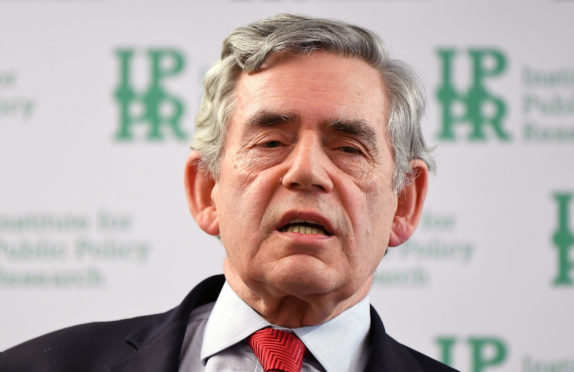
Gordon Brown has claimed that Scotland is at risk of becoming “one of the West’s most divided countries”.
The former prime minister made the claim after a YouGov poll of 2,500 Scots suggested that only 16% believe the country is united.
Commissioned by the Our Scottish Future think tank, the poll also found that 47% of respondents believe Scots will always be divided on the issues of Brexit and independence.
Almost half (44%) of those surveyed also said that they now have less trust in politicians, while 34% said they are less likely to discuss politics with casual acquaintances.
Ahead of a speech at the These Islands conference in Newcastle on Friday, Mr Brown said: “The poll shows Scotland is at risk of becoming one of the West’s most divided countries and stuck in a rut.
“I want us to break out of the trench warfare from which everyone loses out. We are divided because we have been polarised by extreme positions – either a no-change, status quo ‘do nothing’ stance or an ever harder separation including now abandoning the UK pound.
“The poll shows that Scotland is not just more divided than at any time in my lifetime but these divisions could dominate our lives for many decades to come.”
Mr Brown also criticised Prime Minister Boris Johnson for offering nothing other than “cosmetic gestures” to the devolved administrations.
“Scotland looks more like two nations, not the united country I’d like it to be,” he said.
“Divisions over independence and over a referendum are now spilling over into other areas – the future of the pound, the future of Scotland’s relations with Europe, the priorities we give to health, education and high-quality jobs and the environment.
“Nor is there any sign that existing policies can break the Scottish deadlock. Boris Johnson is not offering any new ideas to Scotland and the regions other than the current cosmetic gestures.
“This Punch and Judy cycle – with both sides dug in with all or nothing stances – has got to give way to common sense answers. I want to end the divisions with a plan to bring us back together again.”
The former prime minister also outlined proposals to introduce a series of “Neighbourhood Assemblies” across Scotland in spring, with an aim to find common ground between Scots from all political backgrounds and none.
He said: “With our Neighbourhood Assemblies, we will investigate over the next few months whether the divisions are so entrenched that nothing can be done or whether, as I hope, we can find some common ground to bring people together.
“So we have to listen and be prepared to rethink our view of what the UK is, the shape it takes, what binds us together, or many people fear the UK will collapse in this century just as surely as the British Empire collapsed in the last.
“We need not only to listen and learn, but then have the courage to change and reform. All of us who love Scotland and want the best for its future know Scotland deserves better than this.
“It’s time to do something radically different – work together, not pull apart.”

Enjoy the convenience of having The Sunday Post delivered as a digital ePaper straight to your smartphone, tablet or computer.
Subscribe for only £5.49 a month and enjoy all the benefits of the printed paper as a digital replica.
Subscribe